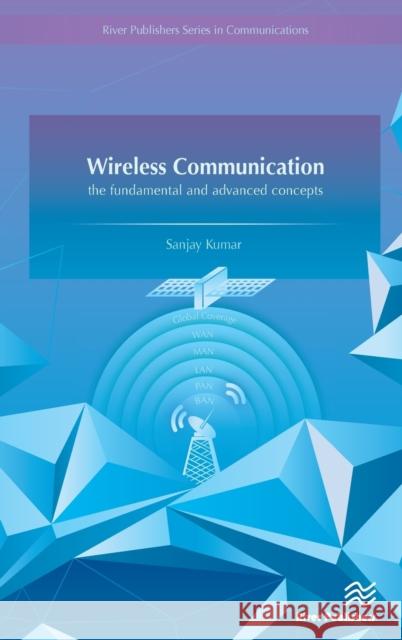Wireless Communication-The Fundamental and Advanced Concepts » książka
Wireless Communication-The Fundamental and Advanced Concepts
ISBN-13: 9788793102804 / Angielski / Twarda / 2015 / 790 str.
Wireless Communication-The Fundamental and Advanced Concepts
ISBN-13: 9788793102804 / Angielski / Twarda / 2015 / 790 str.
(netto: 404,11 VAT: 5%)
Najniższa cena z 30 dni: 420,85
ok. 16-18 dni roboczych.
Darmowa dostawa!
Wireless communication is one of the fastest growing fields in the engineering world today. Rapid growth in the domain of wireless communication systems, services, and application has drastically changed the way we live, work, and communicate. Wireless communication offers a broad and dynamic technological field, which has stimulated incredible excitements and technological advancements over last few decades. The expectations from wireless communication technology are increasing every day. This is placing enormous challenges to wireless system designers. Moreover, this has created an ever increasing demand for conceptually strong and well versed communication engineers who understand the wireless technology and its future possibilities. In recent years, significant progress in wireless communication system design has taken place and will continue in future. Especially for last two decades, research contributions in wireless communication system design have resulted in several new concepts and inventions at remarkable speed.
A text book is indeed required to offer familiarity with such developments and underlying concepts and to be taught in the classroom to future engineers. This is one of the motivations for writing this book. Practically no book can be up to date in this field, due to the fast ongoing research and developments. New developments are announced almost every day, but teaching directly from research papers in the classroom cannot build the necessary foundation. Therefore, the need for a textbook is unavoidable.
The prime goal of this book is to cooperate in the learning process. It is based on current research as well as classical text books in the field and aims to provide in-depth understanding on fundamental concepts, which form the basis of wireless communication and build the platform on which current developments can be understood and future contributions can be made.
This book is written in a self-explanatory manner to facilitate critical thinking and to support self study. Kumar has taken special care to systematically organize and present the wide domain of wireless communication technology in a user-friendly way to enable easy understanding. Therefore, the language of this book is made to make one feel as though they are listening to a classroom lecture. Sometimes, the explanation may seem oversimplified, but this is to help support a wide spectrum of readers and to clarify the hazy picture.
A book of this kind, which addresses a fast developing technology, the frequent use of acronyms and abbreviations is almost inevitable. Kumar has taken care to spell out the acronyms and abbreviations as frequently as practicaly suitable in the text, and a list of acronyms and abbreviations is provided in the book.
Wireless communication is one of the fastest growing fields in the engineering world today. Rapid growth in the domain of wireless communication systems, services and application has drastically changed the way we live, work and communicate. Wireless communication offers a broad and dynamic technological field, which has stimulated incredible excitements and technological advancements over last few decades. The expectations from wireless communication technology are increasing every day. This is placing enormous challenges to wireless system designers. Moreover, this has created an ever increasing demand for conceptually strong and well versed communication engineers who understand the wireless technology and its future possibilities. In recent years, significant progress in wireless communication system design has taken place, which will continue in future. Especially for last two decades, the research contributions in wireless communication system design have resulted in several new concepts and inventions at remarkable speed. A text book is indeed required to offer familiarity with such developments and underlying concepts, to be taught in the classroom to future engineers. This is one of the motivations for writing this book. Practically no book can be up to date in this field, due to the fast ongoing research and developments. The new developments are announced almost every day. Teaching directly from the research papers in the classroom cannot build the necessary foundation. Therefore need for a textbook is unavoidable, which is integral to learning, and is an essential source to build the concept. The prime goal of this book is to cooperate in the learning process. This book is based on current research as well as classical text books in the field, and aims to provide in depth understanding on fundamental concepts, which form the basis of wireless communication and build the platform, on which current developments can be understood and future contributions can be made. This book is written in self-explanatory manner to facilitate critical thinking and to support self study. Special emphasis has been given in this book to systematically organize and present the wide domain of wireless communication technology. Extra care has been taken to present the contents and the concepts in user friendly way to enable an easy understanding. Therefore the language of this book is made to make one feel, listening to a classroom lecture. This makes learning straight forward. Sometimes, the explanation could seem to be oversimplified, this is in order to support wide spectrum of readers as well as to clarify the hazy picture. A book of this kind, which addresses a fast developing technology, the frequent use of acronyms and abbreviations is almost inevitable. A care has been taken to spell the acronyms and abbreviations as frequently as practically suitable in the text. Besides, a list of acronyms and abbreviations has also been provided.











